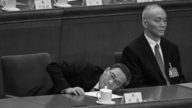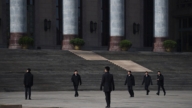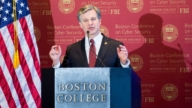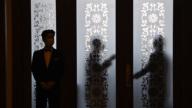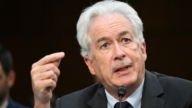【新唐人2012年12月20日訊】日前,中共在海外成立的「孔子學院」召開會議。大陸媒體報導說,「孔子學院」遭遇所謂「成長的煩惱」,全球「孔子學院掌門人」齊聚大會,商討面臨的難題。一度在全球迅速擴張版圖的「孔子學院」,遭遇了甚麼「煩惱」呢﹖
18號,第七屆「孔子學院」大會在北京國家會議中心落幕。代表們圍繞如何融入當地社會與文化,如何破解專職教席之缺,如何實現可持續發展等議題展開了討論。
中共喉舌報導說,「孔子學院」一直採用輪換制的任教方式,師資力量主要靠短期的派遣教師和志願者支撐。專職教席的匱乏,越來越成為孔子學院在海外發展的瓶頸。
另外,一些孔子學院代表坦言,「孔子學院」在海外的推廣中,並不是一帆風順。個別西方國家將「孔子學院」視為政治的附庸,限制在當地的發展。
據了解,「孔子學院」是由「中國漢辦」監督,表面上不是政府機構,但實際上是由中國教育部控制,由政府直接支持。海外《經濟學人》雜誌曾引用一位高官的話說,「孔子學院」是中共重要的海外宣傳機構。
山東大學退休教授孫文廣表示,一個國家如果有優秀的傳統文化,國外人士會積極來吸取。如果利用政府的力量,大力去推廣,往往帶有政治色彩。
山東大學退休教授 孫文廣:「它用成立這些孔子學院,還有推廣孔子,實際上它是想給自己共產思潮做裝飾。現在它用孔子學院來起到虛假的裝飾作用,所以不被外國所歡迎。另外師資也很缺乏,真正有研究,學術上有水平的那些教師,不願意去找這個學院任教。」
廣西自由作家荊楚表示,西方國家是以基督文明作為主流意識形態,雖然孔子有那麼大的影響力和號召力,但是,當中共用政府的權力去推廣,這個東西就一定是自消貨。
廣西自由作家荊楚:「以基督文明做為主流意識形態的社會,排斥孔子學院是順理成章的。它就是有一個顯著的特點,它就是維護專制統治,(孔子學院)有很大的欺騙作用。」
自2004年全球第一所海外「孔子學院」在韓國正式掛牌,8年來,有400所孔子學院和500多個孔子課堂相繼成立。有人做過統計,平均不到3天就開辦一個以「孔子」命名的學院或課堂。
「孔子學院」一年要耗費中國人多少血汗錢?據漢辦2011年度報告及官網消息,自2004年以來,漢辦在全球建立「孔子學院」耗資5億美元。中共主管宣傳的政治局常委李長春,2009年對外說在世界各地建立「孔子學院」是「中國對外宣格局的重要組成部分」。
荊楚:「在海外每開辦一個孔子學院,中國政府就給它幾百萬美元,就這樣子搞,就想把中國(共)文化影響到世界,是共產黨大文宣計劃的一個步驟。這個過程本身就是一個腐敗的過程,使那些國際投機分子就應合中國政府,從中國政府手上騙到納稅人的血汗。」
早在今年5月,博客蔡慎坤,在他的博文「誰在為孔子學院瀟灑埋單?」中提及:業內人士透露,在運營上,每一所孔子學院的共同點都是虧損,巨額虧損。虧損的原因是多方面的,最重要的原因是運作模式與財務狀況不透明。也因此,孔子學院一方面成了中國政府填不滿的窟窿,一方面又成了教育部官員任意提取各國貨幣的取款機。
荊楚指出,中國國內有那麼多簡陋的校舍,有那麼多上不去的孩子,中共卻向國際上大把大把的揮霍。他認為,中共為了虛偽的面子,不顧國內人民的死活,中共政府喪盡天良。
採訪編輯/唐睿 後製/黎安安
Growing Pains for CCP Regime-Funded Confucius Institutes
Recently, Confucius Institutes that have been
established overseas held a national convention.
The Confucius Institute global project is funded
by the Chinese Communist Party (CCP).
China’s media alleged that the Confucius Institute
project has now encountered growing pains.
The head of each Confucius Institute
discussed possible solutions.
What problems is the Confucius Institute facing,
after it has undergone a rapid global expansion?
On December 18, the 7th national convention
of overseas Confucius Institutes ended in Beijing.
The deputies discussed issues on how to achieve local
integration, how to cope with lack of full-time teachers,
and how to achieve sustainable development.
CCP official newspapers said that over years, the
Confucius Institutes have implemented a rotation policy.
This is achieved by dispatching
short-term teachers and volunteers.
The lack of full-time teachers has become a bottleneck
in the development of the Confucius Institute overseas.
Reportedly, some Confucius Institute deputies
admitted that overseas promotion was difficult.
Several Western countries view the Confucius
Institute as a politicized mission of the CCP.
They thus limit its expansion locally, said the news report.
Public data show that the Confucius Institute
is under the administration of Hanban.
This is an organ affiliated with the CCP Ministry of Education.
Li Changchun, the 5th-highest-ranking member of the
Politburo Standing Committee, was quoted in The Economist.
Li stated that the Confucius Institutes were “an important
part of China’s overseas propaganda set-up"
Sun Wenguang, retired professor at Shandong
University, comments on the issue.
A country’s excellent traditional culture will naturally
attract people around the world to go to study it.
But not if a regime vigorously promotes it, and
if it often smacks of political overtones, he says.
Sun Wenguang: “By setting up and promoting
the Confucius Institutes, the regime intends
to cover up its spreading of communism thought.
That’s why Confucius Institutes aren’t welcomed overseas.
A shortage of teachers indicates that the Institutes cannot
attract those teachers with real academic competence."
Jing Chu, freelancer in Guangxi, says that the
Western communities are based on Christian beliefs.
Confucius has been a powerful influence worldwide,
but the CCP regime’s official promotion only indicates
its products must be poor selling.
Jing Chu: “It’s natural that Confucius Institutes
are excluded in a society based on Christianity.
The CCP Confucius Institute project features
safeguarding of authoritarian rule.
And those Confucius Institutes also spread the party culture
to abroad through their education system. It is very deceptive."
The first overseas Confucius Institute
opened in South Korea in 2004.
Since then, 400 Confucius Institutes and over 500
Confucius courses have been set up overseas.
Data show that averagely, in less than three days, an institute
or course would be set up in the name of “the Confucius".
How much money has gone into
the existing Confucius Institutes?
According to Hanban’s 2011 annual report and its official
website information, since 2004, an injection of 500 million
dollars from the CCP regime has been used to set up the
Confucius Institutes worldwide.
In 2009, Li Changchun, one of the former CCP
top leaders, and in charge of propaganda, said that
the Confucius Institute global project is “an important
part of China’s overseas propaganda setup."
Jing Chu: “Each Confucius Institute receives
multimillion dollar injections from CCP regime.
This is a part of the regime’s overseas propaganda
plan to spread CCP’s own culture.
Establishing Confucius Institutes just
creates chances to commit corruption.
Those Western speculators can be offered
money by collaborating with the CCP regime."
In this May, scholar Cai Shenkun commented in his blog.
He asked, “Who is paying for the Confucius Institutes?"
The article said,"Insiders reveal that huge loss is a
common feature of all Confucius Institutes overseas.
These losses have many causes, with the most prevalent
being lack of transparent operations and financial conditions.
Thus, on one hand, the Confucius Institute
project has become a bottomless pit.
On the other, it has turned into an ATM for officials of the
Education Ministry to wantonly withdraw foreign currencies.”
Jing Chu indicates that shabby makeshift school
buildings are commonly found across China.
So many children cannot afford education.
The CCP has squandered in the world to create a disguise
for its rule, while disregarding the Chinese people.
Jing Chu remarks that the CCP regime is utterly immoral.




